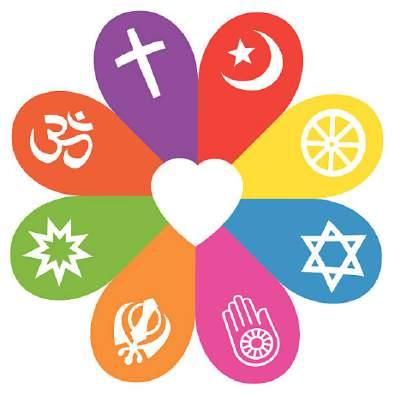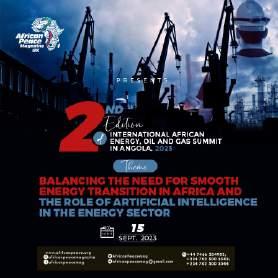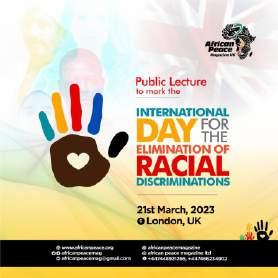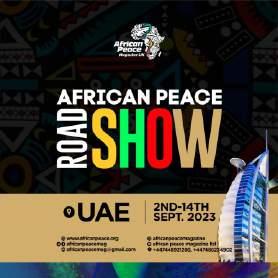
4 minute read
PEACEReligiousTOLERANCE Through
Religious tolerance can be termed as a situation whereby people of different faiths live together peacefully and accommodate each other's view without violent crisis and respect one another's view without clash. It could also be said to be the path to world peace. It could also mean no more than forbearance and the permission given by the adherents of a dominant religion for other religions to exist, even though the latter are looked on with disapproval as inferior, mistaken, or harmful.
To realise global peace implies avoidance of violence or any act other than peacekeeping and follow the ethic that is preached by all religions. Religious tolerance is to maintain peace among people from all over the world as believers and non-believers occupy the same community. A society worth living in is one in which religious tolerance is alive and well. Sociological as religion is, the act of toleration has always had a political aspect as well. Back to history, most incidents and pieces of writings relating to toleration involve the status of minority and dissenting viewpoints in relation to a dominant state religion.
Advertisement
It should be of note that religion can serve as a tool to boost either conflict or peacebuilding. The ignition of any of these determines what the society becomes.
Research indicates that recent violent conflicts also have involved religious beliefs themselves.
However, it may not be the major cause of conflict, even when the opposing groups, such as Protestants and Catholics in Northern Ireland, are differentiated by religious identities, but it has also been a contributing factor in some violent conflicts, whether in its own right or as a proxy for political battles, in places as widely scattered in places like Northern Ireland, the Middle East, the Balkans, Sudan, Indonesia, and Kashmir. Also, activists in religion noted that "religion, unfortunately, is often the most visible difference between contesting groups and, as a result, frequently is blamed for conflicts and it may, indeed, be instrumentalized or become a mask for violence.
Nations without a dominant religious group are on average, 17% more peaceful than countries with a dominant religious group. These countries also have on average 25% less religious restrictions and religious hostilities are 40% lower while countries where 60% of the population identifies with a particular belief system or denomination have a dominant religious group. In Professor Usman Muhammad’s piece titled “Tolerance and Harmony to Fight against Religious Extremism", the lecturer from the Department of International Relations at Kaduna University in Nigeria, admonished the Community to make use of the national legislations to the urgent need for resilience and countering violent extremism.

In the piece, he believed legislation in force in ECOWAS member countries is for tolerance and freedom of worship. But the reality on the ground is different, according to him, given the manifestations of religious extremism which affect several States. He therefore invites parliamentarians to adopt national laws which further repress these abuses and promote religious tolerance and harmony.
According to the President of the Lutheran World Federation (LWF), Rev. Musa Filibus, he also dislocated religious tolerance and peace building often led to track development in Nigeria. He said no nation can develop when there is absence of peace building and religious intolerance. Research by the Institute for Economics and Peace (IEP) indicates that when it comes to affecting levels of peace within countries, religion is not a major driver. The research which was published in 2014, mentioned other socio-economic factors have a more significant influence on peacefulness than religion. Factors such as Corruption, gross domestic product per capita, inequality, gender, political terror and intergroup cohesion all have a greater correlation with the level of a country’s peace than religion.
It shows that these factors are globally factors in driving violence and conflict in society than the presence of religious belief. The only significant connection between religion and peace found in IEP’s analysis is that high levels of peace are related to either low levels of religious diversity, or high levels of religious diversity. Moderate levels of diversity see lower levels of peace highlighting the bell curve nature of the link between peace and religious diversity. The research revealed the empirical relationships between peace, as measured by the Global Peace , and various religious measures Index related to levels of religious belief, restrictions and hostilities towards religion, combined with a number of other socio-economic factors, to statistically explain the relationship between conflict, religion and peace. It came up with higher levels of peace in countries without dominant religious groups and less government restrictions on religion.
Religious plurality appears to have a pacifying effect, if there are no official restrictions. Alternatively, if the members of a religious group dominate, they are likely to be able to access and use the power of the state, which can lead to persecution of other religious groups.
, Representatives of Dr Samuel Lamptey the ECOWAS Commission in Cape Verde once disclosed religious intolerance poses a threat to the region’s development and integration programme in a delocalised meeting of the joint Committee on Education, Science and Culture/Committee on Health/Committee on Telecommunications and Information Technology, themed, “Religious tolerance and harmony: Essential factors for development, peace and stability in ECOWAS region”. The Ecowas Community of West African StatesECOWAS, created on May 28,1975, by the Lagos Treaty, has the mission of promoting regional cooperation and integration with a view to create an economic union in West Africa and thus contributing to improving the standard of living of their populations.
However, the cyclical conflicts and the instability that occurred in our sub region in the 1990s, early 2000s and that continue to the present day, led to the conclusion that the desired economic prosperity, translated into the guarantee of economic growth, promotion of good relations between member states, progress and development of the African continent, cannot be achieved in the absence of peace and security in the sub-region,” he said. The need for religious tolerance, therefore, cannot be sidelined in the development, growth and sustainability of any nation. There are more to development when religious tolerance exists than not.
















